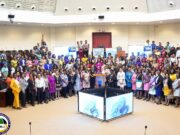(This column is an extract from a detailed and critical review conducted by this author on the subject)
Introduction
On December 23, 2013, the member states of the United Nations (UN) passed a resolution dedicating a decade to addressing the challenges confronting people of African Descent globally. During the Decade (2015-2024), nations are called upon to create programs focused on recognition, justice, and development for people of African descent. The Cooperative Republic of Guyana is a signatory to the UN Declaration. The goal is to address the historic and present discrimination against African descendants. A Steering Committee of African Guyanese organizations’ deliberations ultimately led to the signing of a Compact and to the creation of the current structure―the International Decade for People of Africa Descent Assembly-Guyana Country Coordinating Mechanism (IDPADA-G CCM). The Government of the Cooperative Republic of Guyana fully funded IDPADA-G from its 2018 national budget.
The Decade, which began on 1 January 2015 and will end on 31 December 2024, was proclaimed by the United Nations General Assembly in its resolution 68/237, with the theme “People of African descent: recognition, justice and development”. By its resolution 69/16, the Assembly adopted a programme of activities for the implementation of the Decade. The overall objective of the Decade is to promote respect, protection and fulfilment of all human rights and fundamental freedoms of people of African descent.
The General Assembly also identified the following specific objectives:
(a) To strengthen national, regional, and international action and cooperation in relation to the full enjoyment of economic, social, cultural, civil, and political rights by people of African descent and their full and equal participation in all aspects of society;
(b) To promote a greater knowledge of and respect for the diverse heritage, culture, and contribution of people of African descent to the development of societies;
(c)To adopt and strengthen national, regional, and international legal frameworks in accordance with the Durban Declaration and Programme of Action and the International Convention on the Elimination of All Forms of Racial Discrimination, and to ensure their full and effective implementation.
In addition to those objectives, the General Assembly recommended activities to be carried out, in particular by Member States. In the Programme of Activities for Implementation of the International Decade for People of African Descent, relevant United Nations programmes, funds, specialized agencies and other bodies, in particular the Office of the United Nations High Commissioner for Human Rights (OHCHR), the Department of Public Information of the Secretariat and the United Nations Educational, Scientific and Cultural Organization (UNESCO), regional organizations, financial and development institutions, national human rights institutions and civil society are requested to take specific actions.
The General Assembly appointed the United Nations High Commissioner for Human Rights to act as coordinator of the Decade in order to follow up on the implementation of activities in the framework of the Decade.
The Problem
The incumbent government has refused to disburse funds from the national budget to the organization due to a number of issues surrounding the organization’s financial management and accountability. As such, the government has disbursed funding directly to the member organizations of IPADA-G. To date, the dispute between IPADA-G and the Government of Guyana (GoG) remains unresolved.
In the meanwhile, IPADA-G continues to defend itself in the public domain that it has been accountable to its membership and that there is no problem with regard to mismanagement of the organization’s finances.
Discussion, Analysis, and Summary of the Findings
IPADA-G conducted a needs assessment which formed part of its strategic plan and analysis. The study covered three broad thematic areas―namely, economy (discrimination by the State in the award of public contracts, etc.), employment (factors responsible for high rates of unemployment among African Guyanese), and equity/equality (practices by other groups including the State that actively discriminate against African Guyanese.
The implementation plan placed heavy emphasis on addressing the findings derived from the needs assessment. Of note, the survey sample size used in this study failed to conform to the minimum requirement for studies of this nature.
Typically, a sample size representing 10% of the population is acceptable. The African Guyanese population accounted for 29% (218,111) of the total population according to the National Census Study of 2012.
Alternatively, researchers tend to regard 100 participants as the minimum sample size when the population is large. In most studies, sample size is determined by two factors: (1) the nature of data analysis proposed and (2) the estimated response rate. By these standards, the sample size of the study represented 0.008% of the African Guyanese population and 17% of the alternative minimum benchmark of 100 participants.
The research technique employed failed to test the validity of the hypotheses. The findings are generally based on the participants’ perceptions rather than hardcore empirical evidence. For example, by the respondents’ own admission that African Guyanese lack the capacity and resources to pursue public contracts suggest that a relatively small group of African Guyanese contractors pursue public contracts.
A lack of participation, therefore, cannot be equated to discrimination. And even in cases where there is participation but were not successful, this is also true for other races who participated in a competitive process and loss to a competitor.
It was found that the programme activities and objectives of the International Decade for People of African Descent ought to have been led by the State according to the resolution of the United Nations General Assembly.
Instead, in the case of Guyana, a non-profit company was incorporated, and the work of the organization was carried out with almost no substantive involvement on the part of the State save and except for the annual subvention from the national budget. Hence, the governance structure adopted is arguably a divergence from the intended model contemplated by the United Nations.
Consequently, in the case of Guyana, IPADA-G’s mission was reduced to a mere advocacy body, which is a stark departure from the programme activities and objectives for the International Decade for People of African Descent.
It was noted, as well, that each member State that participated in the programme is required to submit an annual progress report to the United Nations. The report covers an update on the progress made in the implementation of the activities set out in the Resolutions and the achievements in line with the objectives for the International Decade. To this end, a perusal of the consolidated reports submitted to the United Nations confirmed that no such report was ever submitted for Guyana for the period 2015-2022.
Moreover, it should be noted that the programme expires in December 2024, less than two years remaining and there has been no substantive progress for Guyana considering the aforementioned findings.
Recommendations
In view of the findings derived from this critical review, the following recommendations are hereby put forward for consideration by the Government of Guyana:
i) The Government should take immediate steps to conform to the objectives of the United Nations for this programme by leading the implementation of programme activities and pursuing the objectives. In so doing, the proposed governance structure should be in the form of an independent Commission with features similar to other existing independent constitutional Commissions.
ii) All of the various African Guyanese organizations would need to be part of the Commission whereby a special committee of stakeholders can be formed under the Commission. Through this framework, the government with the inclusion of a role for the National Assembly should implement the activities of the programme, whereby similar actions undertaken by other countries can be undertaken, where applicable.
iii) Through a consultative process, the legislative framework would have to be examined to inform any proposed legislative changes or the introduction of new pieces of legislation.
iv) The Commission would need to, through consultative process, design programmes, policies, and initiatives in line with the objectives of the United Nations, for implementation by the Government.
v) IPADA-G can remain an important organization as a key stakeholder in the framework described above. However, IPADA-G may no longer be eligible for subventions directly from the State.
vi) Although the International Decade programme expires in less than two years, and that Guyana has not made any substantive progress given the diversion as contended in this review; the Government should consider, by way of an amendment to the Guyana Constitution, to make this Commission a permanent constitutional Commission. This would allow for the ongoing pursuit of the objectives of the programme. And more so, especially against the backdrop of the underlying ethnic realities that characterize Guyana’s fragile political landscape.
Notwithstanding, it is worth noting that Guyana is irrefutably ahead of many countries in so far as the objectives of the United Nations International Decade for the People of African Descent is concerned. In this respect, substantive empirical evidences have been well documented in a 100+ pages response by the Government of Guyana, to allegations to the contrary by IPADA-G in a report to the United Nations.
About the Author
Joel Bhagwandin, MSc., is the Director of Financial Advisory, Market Intelligence, and Analytics at SphereX Professional Services Inc. He can be reached at [email protected].









